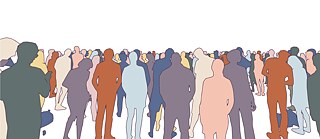Few topics are as fiercely debated today as the "migration crisis". But does Germany truly face a problem of excessive immigration? The situation is paradoxical: despite widespread labor shortages across the country, the focus of politicians and the media remains fixed on one issue: deportation.
The population's composition has shifted dramatically: In cities across former West Germany, children with a migrant background—those with at least one parent born abroad—now make up the majority of the under-six age group. Moreover, the persistently low birth rate and insufficient net immigration have resulted in a severe labor shortage. This trend was already predictable 15 years ago, yet when I warned in lectures that employers would soon be competing for workers, I was often met with blank stares. Political and economic elites, accustomed to an era where job seekers outnumbered jobs, frequently dismissed my concerns with a sense of complacency.Today, in 2024, the challenging situation on the labor market can no longer be denied: companies, the retail sector and restaurants are all desperately looking for personnel – in every survey, the “skilled labor shortage” ranks among the top problems faced by the German economy. In fact, it is not only “skilled professionals” who are in short supply, as all segments of the labor market are suffering from the lack of personnel. Given that this is the case, it is extraordinary that politicians and the media engage in almost obsessive debate about the excessive number of migrants coming to Germany. Since 2023, the “migration crisis” has snowballed to the point where political parties both in and outside the government essentially agree that the German state makes it “too easy for those who wish to profit from our welfare state,” as Finance Minister Lindner puts it; the European Union believes that it should rid itself as quickly as possible of Ukrainians who do not work, while the Chancellor continues stoically to repeat his mantra that people should be deported “on a grand scale”.
Deporting potential workers and taxpayers
Now, 80 percent of those who have fled the war in Ukraine since 2022 are women on their own with children, so accusing them of being work-shy seems rather harsh. Moreover, many refugees have had to face the fact that state welfare payments are rarely compatible with employment, meaning that the state is literally creating incentives not to work. Germany’s Residence Act was amended a whopping 71 times between 2015 and 2023 – around nine times a year on average, in other words. Even seasoned lawyers can hardly keep track of all the things that make the lives of refugees (and indeed of migrant “skilled professionals”) so unnecessarily difficult. And yet the influx of Syrian and Iraqi refugees has been a success story nonetheless: by 2022, nearly 60 percent of people who had still been receiving basic welfare provision from the state between 2014 and 2016 had a job subject to social insurance contributions – despite having low educational qualifications. This begs the question why rising numbers of asylum seekers cause such hysteria and whether deporting them “on a grand scale” would not in fact be tantamount to deporting potential workers and taxpayers.Perhaps all the saber rattling would be easier to understand if one were to consider the latest successes of the “Alternative for Germany” (AfD) party that is openly racist in its opposition to immigration to Germany. Against this backdrop, more moderate parties are clearly keen to regain some ground. That said, the AfD is seeing its biggest wins in the new German states whose populations declined massively between 1990 and 2022: by between 14 percent (Saxony) and a quarter (Saxony-Anhalt). In other words, opposition to immigration is most notable in places with the highest rates of emigration themselves and where even in structurally weak regions many jobs cannot be filled. That is not at all easy to explain, but one thing is clear: the reasons for the AfD’s successes are to be found elsewhere, and parroting their slogans reinforces a racist worldview: in such circles it has always been claimed that there was a “migration crisis” about which the established parties were doing nothing.
A crisis of self-image
However, the anger of the right-wing populist milieu is also directed against Germans with a migrant background who are regarded as “unassimilated”. Now, as mentioned above, the composition of Germany’s population has changed dramatically. In 1998, a German government acknowledged for the first time that migration was “irreversible” (previously, this had not been the official view), and in 2000 the “jus sanguinis” principle, which had applied until then and linked citizenship to biology, was fundamentally liberalized. That said, the mindsets and approaches from before have in many cases not changed at the same time. As far as immigration is concerned, the principle of “integration” continues to apply. Though this can have a pragmatic side (integration into the labor market, for example), it is all too often associated with the romantic notion of a pre-stabilized national identity that ultimately causes discontent above all: never is everyone “integrated” enough, and society is always too “split” etc.This makes it all the more difficult to see what has been accomplished; after all, experience shows that everyday coexistence frequently proceeds in a comfortable fashion and indeed is often handled well by local politicians. It seems that Germany has less of a “migration crisis” than a crisis of self-image. For people like me who have long been engaging with the issue of migration, this comes as anything but unexpected. Things have not been running smoothly for years, and national politics is making an increasingly clueless and chaotic impression. In such a situation decision-makers should show less in the way of “Insta” reactions and instead should develop and pursue a plan for the consistent modernization of Germany. After all, a mental crisis is never far away from a complete breakdown.
